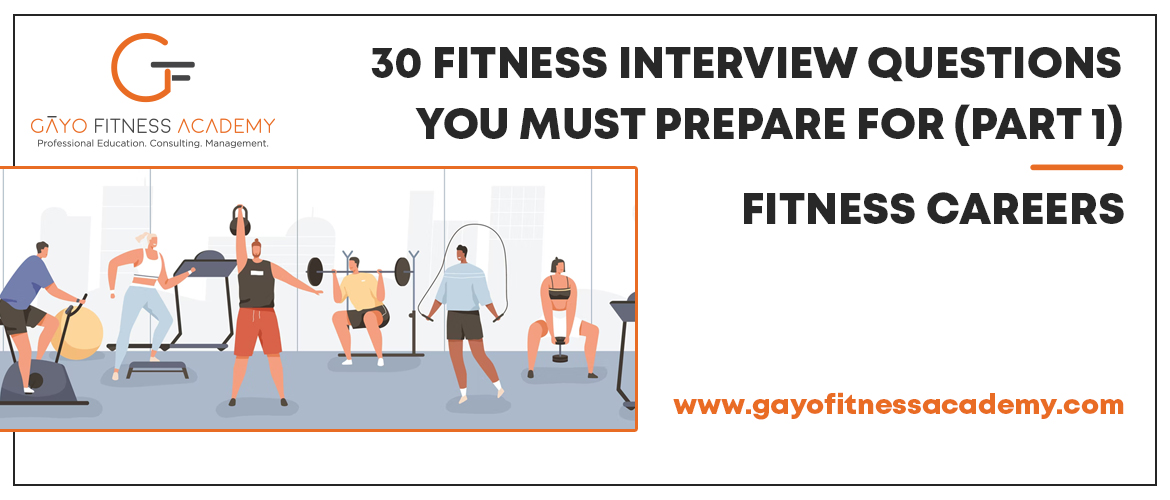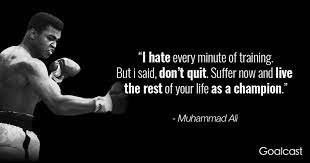30 Fitness Interview Questions You MUST prepare for (Part 1)

In one of our earlier blogs, “Sell Yourself in the Interview!” we detailed the preps the fitness professional must do before the interview. The questions that may be asked in the interview are hard to predict but not very easy to anticipate!
At the end of our personal trainer courses, we conduct a useful workshop on how to prepare for job interviews. After all. Professional skill sets need to be delivered to the client in the gym or elsewhere indoors or outdoors. To open the doors (no pun intended), you need to do exceedingly well in the interviews.
The feedback that we got from our students – as also, other fitness professionals – has motivated us to present a collection of questions that must be anticipated.
In this 3-part blog, we address 30 possible questions, ten of which are taken up here in this first part.
Q1. Why do you want to become a personal trainer?
Most often, the best impression is the first impression. This question is one of the first to be asked. So, how you answer this or similar question will actually depend on your truthfulness and how much you want to reveal it (to the strangers socially distanced from you in a formal setting).
Your answer will include some or all the points –
- Your passion to help people – therefore, it gives you emotional job satisfaction
- Social standing – people will see you is not only fit but is actively committed to helping others become fitter and healthier
- You love physical movement; you want to share with others the joys of physical movement
- Helping one person to get fitter means getting his / her family, community and the nation fitter. This gives you immense pride
- Fitness is the need of the hour – COVID19 has made us aware of the immense possibilities of helping special populations, especially with comorbidities
- Senior fitness professionals – like athletes at all competitive levels – have had to conquer their “demons” (fears, anxieties, health issues like obesity for example, financial and social pressures, etc.) in achieving their fitness and sporting goals. You too have had to overcome these obstacles. So, you will empathise with the struggle and dedication of the clients you will have to train and work with. This is one truly effective response your answer should include.
Be confident. Display your passion in your answer. Help the interviewer know something about your challenging and exciting journey that will make you stand out from other candidates.

Q2. Tell me about your customer service experience.
In India, this kind of question has become common in FITNESS interviews only in the last two COVID19 years. It has been a standard question in interviews when applying for jobs in retail and marketing. In India, as across the world since earlier times, the interviewer wants to know how you have been helping clients negotiate the gym and offering expert advice is just part and parcel of your daily routine.
If you are newcomer, do not be afraid to say you have no experience but this is how you plan to serve the client – and then give specific examples of how you will help customers. Your examples may not be fitness-specific. If you have customer servicing experience in another career and it can be applied in Fitness, mention these too. Come with examples of when and how you helped family and friends. The key point here is to show to the interviewer how well you understood the person’s needs and then communicated effectively.
instructorship and the kind of fitness or exercise format that you want to be in will influence the kind of gym you want to work for.
Do you want to specialise in helping clients build body mass and muscle and work in a Crossfit box or a purely strength gym? Do you want to train only to male or female clients – or, you are comfortable training both? The type of gym that you ultimately end up applying to work in will help you answer this question with ease. Is the gym a part of a chain. will the job be a transferable one? So, do your homework well in this area.

Q4. How do you update your fitness knowledge?
With new, different exercise formats and new developments in Fitness Sciences you have to keep up to date with them. This is essential for developing into a successful fitness professional. In the West, great emphasis is placed on continuing education (CE) or what is termed as continuous professional development (CPD) in Europe. In India too employers are beginning to see what the candidate is doing to improve his skill sets. While CE / CPD is mandatory for certificate renewal in some countries, over 90% of gym managers and owners now see this as an effective way to increase revenue not only for their gyms but also for the trainers. This question gives you a chance to convince the interviewer that –
- fitness is truly your passion and not just a job: you are committed to a long-term career
- your CE / CPF makes you more competitive than other trainers
- you will be able to fitness goals to clients that much more effectively
- you will be able to help the gym retain clients that much longer
- you will help reduce costs to the gym – you have the capability to do the work of two or more trainers
- you will thus generate more income for the gym
Our advice to Indian fitness pros is this: do not see earning CE / CPD units as a mere expense incurred to only renew a certificate! See them as a means to developing new professional skill sets that are more relevant today. Gone long, long ago are the days when 20-25 weight training exercises were all that a personal trainer needed to know!
Q5. What are your thoughts on a keto diet?
This is a sample question to test your general information about current trends in dietetics and nutrition.
Here your answer ought to include these points –
- you have a general knowledge of diet and nutrition as relevant to a personal trainer
- Nevertheless, in your opinion, “Ketogenic diet” is a term for a low-carb diet through which the goal is get more calories from protein and fat and less from carbohydrates; the idea is to cut back most on the carbs that are easy to digest, like sugar, soda, pastries, and white bread.
You personally may not be on a keto diet but as fitness professional, you ought to know the current trends. Other examples include vegan, paleo, South Beach and intermittent fasting. Knowledge of macro and micronutrients and such concepts in diet and nutrition subjects may not be asked in the interviews – these are topics you are presumed to have mastered! The interviewer wants to know how you will deal with clients’ queries.

Q6. What according to you will be a successful training session?
Obviously, the successful session will depend on the success with which the client is progressing towards his / her goal.
There are at least 16 types of fitness goals and a vast majority of clients will have a permutation and combination of them. So, your response ought to include the following points –
- Some fitness goals are easier to achieve – e.g. muscle mass – while some others need more effort from the clients – e.g. fat loss. Now what if the client has hypertension and obesity?
- The success of a specific session will be gauged on the accomplishment of the training goals for that day (microcyle) in an injury free and safe manner. That the session has been a success will be decided mutually by the client and you – so, to find this, you will give your post-session feedback to the client and gently nudge responses from him / her!
- A session or microcyle is just one step on the path to achieving mesocycle and macrocycle goals. So, each session must be evaluated in the context of the mesocycle and macrocycle – did it help the client and you move forward?
- If possible, share with the interviewer a recent example of a client that you have worked with. Do explain your approach to personal training and the methods – remember, we have eight general training technologies – that you use/d to make each session a success.

Q7. How do you keep clients motivated and engaged?
We often mention this in our Exercise & Fitness Psychology (ManTra) workshop which is also part of our Mumbai U – EREPS Level 4 personal trainer course: you are a fitness professional because you are driven by passion and love for physical movement, exercise and / or sport. Many of your clients are there only to achieve specific fitness goals and they need to be motivated through the application of performance Psy techniques.
So, your response to this kind of question ought to include these points –
- You will use Exercise & Fitness (sports performance) Psy techniques to inculcate in the clients a high degree of –
- Motivation
- Confidence
- Concentration
- Goal setting
- Visualization
- You will base the training program not only on basis of the client’s fitness assessment but his / her personality traits. For example, a social, outgoing personal may prefer group exercise while a shy, withdrawn person may like to have 1-on-1 sessions.
- You will brief the client before each session starts
- You will debrief hi, / her at the end of the session
- Close each session with positive affirmations.
Impress upon the interviewer that you value the client who in many ways justifies your career and life. Use the often quoted saying: When client comes first, he will last!
This hopefully will convince the interviewer about your ability to sell yourself to an often hesitant, shy client who may have doubts and misgivings when first exercising in the gym.
Q8. What relevant certifications do you possess?
To become a fitness professional, you must hold some form of a recognised qualification. Generally, you will need to have enrolled to a certificate program which may be as short as three months or as long as six months to complete.
Reach the interview venue readily prepared for your interview with the copies of your certifications. If you are looking for a job within India, be sure to carry your “qualification” certificate (QC) which is the certificate that states that you have successfully completed a personal or fitness trainer course. If the QC has an expiry date, be sure to carry the renewed certificate. Whether or not the QC requires renewal, if it is more than two years old, please see that you have completed at least 20 hours of additional training in the form of CEs / CPDs.
If you are looking for job in countries that maintain a national register of exercise professionals, be sure to hold the certificate of the correct “Level”. In addition to the QC, you must also carry the accreditation certificate. For instance, in our case, the Mumbai University certificate is the QC while the EREPS Level 4 certificate is the accreditation certificate. This latter certificate is required for converting your personal trainer qualification certification to the locally required level – e.g. to CIMSPA level in UK or Category A level in UAE REPS, and so on.
You may also present certificates which show you have done additional training – e.g., in Pilates, Plyometrics, etc.
One thing for sure: the interviewer will ask you questions on the subjects covered by the certificate. For example, he / she may even ask you to demonstrate an exercise in Pilates on Mat if you present the relevant certificate!
If you are FACPR-AED certified, be sure to be asked questions in this area – e.g., what is an AED how many chest compressions and breaths make one CPR cycle? For that matter, if you say you sing well, you may even be asked to sing a song at the interview! So, prepare and practice the exercises that are covered by the certificates.
Q9. What makes you a good fitness trainer?
First, ask yourself what makes you different from other fitness trainers. Also, ask your family members, friends and fitness colleagues. How will you be different from other trainers?
As part of this response –
- summarise your qualifications and certifications
- outline your previous experience
- mention occasions when you were awarded for your work or when you received testimonials from clients
- mention some of your own unique qualities – e.g., –
- language skills in English and other language/s
- additional training and certifications indirectly related to Fitness but will help you in your professional – e.g., MS Office suite, massage therapies, injury rehab, etc.
Q10. Are you a good team member?
A very pertinent question, this. A gym is has a lot of staff – front office, back office, housekeeping & maintenance and of course, trainers. Your response ought to include the following points –
- you grew up in a family which encouraged the spirit of “give and take”
- you schooling and social relationships also encouraged this spirit
- perhaps, you played team sports which cemented your belief that there is strength in unity.
- You are aware that a gym has many individuals who together can serve the clients
- Teamwork divides the tasks but multiplies the success!
In the next part of the blog, we will look at some more questions!
If you have a question, connect with us!

